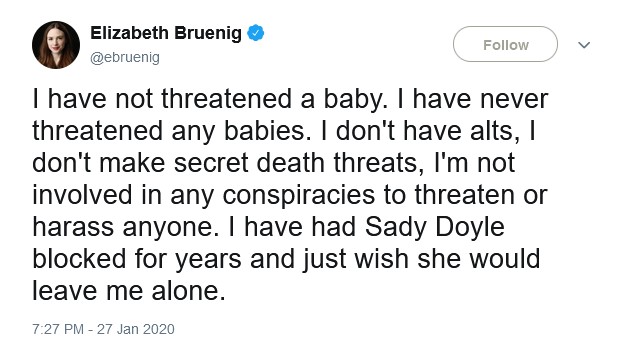We’ll probably never have a completely accurate tally of how many MAGA Cultists have been cut off and left in the cold this Thanksgiving, but we do know that a vast throng of fascists — including the hubris-fueled, dumb-as-rocks propagandist Jesse Watters — has been disinvited and told in no uncertain terms not to come home this week. And now these hateful morons are starting to lose what little of their minds they still possess. Speaking for myself, I refused to attend the Thanksgiving dinner for which I had planned to cook many tasty and hearty side dishes (homemade sourdough stuffing, my four cheese mac and cheese, corn bread casserole, and numerous other delicacies that have made many guests ranging in age from six to sixty-six squeal with delight), once I had learned that a Trump voter had been invited. I was specifically trying to honor one of the sensitive guests — an extremely kind, endearing, and very shy seventeen-year-old (son of a friend) who asked me very politely to refrain from talking politics. Had the entire guest list been comprised of people who stand for democracy, this would have been effortless. It’s the MAGA fuckwads, after all, who want to keep dragging up politics and who hope to “own the libs” with their deranged fantasy football stylings. (Less easy for me is refraining from saying “fuck” for long periods of time. The longest I made it was three hours at a Xmas gathering before I slipped. And after my loose lips betrayed the blunt truth of my ship, my friend hugged me and said that she was very proud of me for managing to make it that long. What can I say? I’m a profane yet erudite motherfucker who tries to atone for his inveterate NC-17 vernacular by dropping as many arcane ten cent words into a colloquy as I can through blind instinct. But I digress.)
The upshot is that I am not going to walk on eggshells anymore. There has always been a line in the sand. I’ll never break bread with a fascist. I am simply not going to tolerate anyone who stands against women’s rights, for mass deportation, for unmitigated restrictions on marginalized groups, for the erosion of education funding, for tariffs and economic devastation that will hurt the most vulnerable members of our nation and line the coffers of the plutocrats, and for restrictions on free speech and the intimidation of alternative voices. No. Fuck off. I’ve urged people to cut the bastards off and I mean it. If you are a fascist, I will denounce you with the most devastating vitriol I can summon and ostracize you loudly.
I can name four friends who are in a similar boat. And we’re all regrouping, gathering for some quiet moments of camaraderie. A time of peace and good eating should not be sullied by these evil goons. If you stand for an ideology that wishes the people I love and me dead, then why on earth would you ever think I could be civil with you in any way? You stand against humanism. You are my sworn enemy.
One would think that the MAGA fuckwits would be happy about this state of affairs. But it’s clear by their vociferous pipsqueaking on my social media feeds and, closer to home, by their desperate attempts to get back into my good graces that they’re not. Now that they realize that the only company they will have for the holidays will entail hateful, humorless, miserable, and uneducated jackanapes, they’re starting to understand just what they’ve lost. Well, tough titty. Don’t look at me. I voted for the centrist democracy-friendly candidate, despite the fact that it involved a lot of compromise of my leftist principles. You voted for the authoritarian strongman and you won everything. Why aren’t you happy about that? Go and consort with your fellow white supremacists and fuck off until the end of time. I mean, come on, aren’t you living the dream?
Well, their “dream” involves us, whether we like it or not. They are so obdurately wretched that they are trying to follow us like rats fleeing a sinking ship. And they are surprised when their feeble minds and flaccid bodies collide into a glue trap. You see, it’s not enough for them to win. What they want is to make us their subservient little bitches. What they are interested in is establishing a new pecking order in which they are on top. They try to taunt us and “expose our hypocrisy” with such hacky zingers as “Another member of the tolerant left.” But as Andy Khori wisely pointed out, the “tolerant left” idea is an invented term of art by the right. It’s designed to inoculate these uncomprehending lemurs from criticism. They’ll never answer to their own complicity in supporting a deranged ideology in which more women die, more families are torn apart because some of them weren’t born on the mainland, and in which LGBTQIA people live in great fear for their future. But they will try to use “tolerant left” as a gotcha point when the truth of the matter is that every political ideology and every form of morality does possess a hard limit on what is considered acceptable.
And now that these dimwitted and entitled little dipshits are starting to learn that we do have boundaries, they’re stunned to learn that they can’t get away with their platitudes and their FOX News mimesis anymore. They’re learning very swiftly that we’ve always been intolerant of any baleful force or figure standing in the way of education, democratic possibility, and human rights. And they’re also learning that we can fight just as dirty as they can, starting with the punishment of social isolation and, if they get more hot and heavy, a peremptory declaration that they are no longer a part of our universe.
“Can’t we just agree to disagree?”
Nope. Talk to the hand. You were eager to usher in a world in which boys are now threatening girls with the phrase “Your body, my choice.” And, as far as I’m concerned, we now no longer have anything in common. For what is the point of a belief structure if we don’t turn our backs when those wildly arrogant Icaruses insist on flying too close to the sun?
But, oh, how they need us! Oh, how these idiots chirrup with half-baked incoherence and small dick energy in the replies! And they can’t own who they are and the disgusting values they represent. They know that they’re now going to have to consort among themselves, without our wit, bonhomie, and all-around decency (and, in my case, my kickass cooking). They know that the only company they will keep will be braindead red baseball cap-wearing zombies who are equally unpleasant.
So call me a proud member of the intolerant Left. If you’re a fascist, you won’t get an invite to my happy life. If you’re drowning in debt after the tariffs kick in, I’ll watch you suffer from afar and not lift a single finger to help you. Because you crossed the point of no return. These fools are now squirming within a nadir of cruelty and insensitivity for which there can be no Venn diagram. They are a hostile threat to all of the human values I hold dear. They have nothing but hate, intimidation, and threats. They have no original thoughts or real ideas. They are completely incapable of understanding historical patterns. And they know deep down that they lack resilience and resourcefulness, two vital qualities for surviving the upcoming dark age that we have and they don’t.
You can also call me an elitist. I don’t care. Although I should point out that the bar for entry into my world is astonishingly low and easy: if you don’t know something, ask a question. That’s it. I’m never going to call your question stupid, even if everyone else in the room knows the answer. You asked. And that counts for something in a world increasingly hostile to facts and checkered by anti-intellectualism. But the fascists cannot even summon the basic grace to do even that. They are incapable of respect, curiosity, humility, or broadening their minds or their empathy. They really believe that they can go about living in this nation, under this wildly dangerous and narcissistic authoritarian, without ever comprehending the impact of vital institutions, once untouchable, permanently dismantled by nihilistic fascists who hope to obliterate decades of progress.
I’m a member of the intolerant Left because I love what used to pass for my country. If we become two Americas because half the hateful rubes wanted to blow up the bridge, then so be it. My side is smarter, pluckier, and more inclined to survive, especially if we keep resisting hard. I have no qualms about transforming the stupidest and most callous members of our nation into braying pariahs. Much in the way that I show no remorse in cutting off a toxic “friend” from my life. The MAGA Cult are abusive addicts who have demonstrated that they fall below the baseline for decency. And now they’re going to learn about what the criminologist John Braithwaite called reintegrative shaming. In his studies, Braithwaite found that ostracized criminals showed a higher probability to fall into recidivism. And that’s what we’re seeing from these red state hayseeds: recidivism. Through death threats and calling me “soyboy” and attempting to belittle everything about life that is fun and joyful. It would be one thing if some members of the MAGA Cult were to prostrate themselves at our feet and beg for forgiveness and ask us for help so that they can better understand the impact of their uninformed vote, perhaps even joining us in the fight against despotism. But they have demonstrated no such inclinations. They would rather double down on their xenophobia and their belittling of anyone who isn’t white, male, hetero, and cis. That’s a line that I refuse to cross. And if it makes me “intolerant,” well calling me a member of the “tolerant Left” isn’t the flex you think it is.


